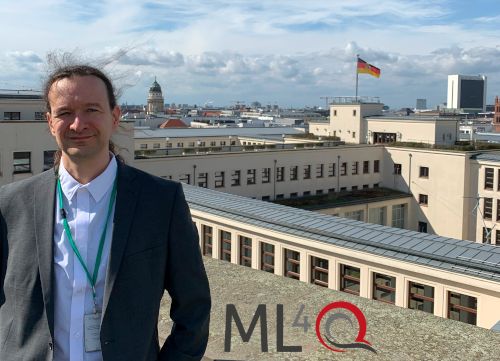Brown bag lunch with David Gross at the German Federal Foreign Office
On March 30, Prof. David Gross visited the German Federal Foreign Office and met with the head of the foreign IT as well as with staff members of the central department for an in-depth exchange about quantum computing and its relevance for e.g. cryptanalysis. This was followed by a brown bag lunch in which Gross explained the basic features of quantum computing and the potential consequences. The lecture, which was already in high demand in advance, was followed online by about 70 participants, from the Berlin and Bonn sites, but also from 14 foreign missions from Jakarta to Karachi, from Pretoria to London.
 The invitation was extended by the data lab of the Federal Foreign Office. By setting up data labs in all federal ministries, the German government intends to future-proof the digitization of public administration and create scope for the use of new technologies. In addition to ad-hoc processing of in-house tasks, the data lab of the Federal Foreign Office implements larger data projects, drafts a data and digital strategy and creates a data catalog. In addition, the data lab is the unit responsible for PLAIN, which is the interdepartmental standard platform for data work and AI.
The invitation was extended by the data lab of the Federal Foreign Office. By setting up data labs in all federal ministries, the German government intends to future-proof the digitization of public administration and create scope for the use of new technologies. In addition to ad-hoc processing of in-house tasks, the data lab of the Federal Foreign Office implements larger data projects, drafts a data and digital strategy and creates a data catalog. In addition, the data lab is the unit responsible for PLAIN, which is the interdepartmental standard platform for data work and AI.
In his lecture, Gross took his audience on a journey from classical mechanics to the birth of quantum mechanics and highlighted its problematic philosophical implications. His introduction to the use of quantum mechanical theories for quantum information was enriched by entertaining anecdotes about David Deutsch, Hugh Everett and other influential scientists. The lecture concluded with an explanation of the basic principle of quantum computers, the challenges in current research and the possible areas of application for quantum computation.
Gross did not miss the opportunity to comment on the current media hype surrounding quantum computing with all the regularly announced quantum advantage demonstrations. He pointed out how many industrial and academic players as well as government funding programs are investing significantly in this technology of the future and made clear how much work still needs to be done in basic research to pave the way for high-quality quantum computers and to create the theoretical basis for socially relevant applications
The many questions from the audience during and after the presentation as well as the exceptionally positive feedback in chat and via e-mail testified to the broad interest of the audience in the topic presented. Although quantum computing will probably not find any direct applications in the core business of the Federal Foreign Office beyond cryptanalysis, this future key technology is nevertheless also politically relevant in contact with other governments, research institutions and companies. In this respect, the visit served its purpose and provided the employees of the Federal Foreign Office with comprehensive and entertaining information.
Dr. Friedrich Schluck, Referat 130 Grundsatz Datenstrategie und -Politik, Datenlabor, PLAIN
Related articles